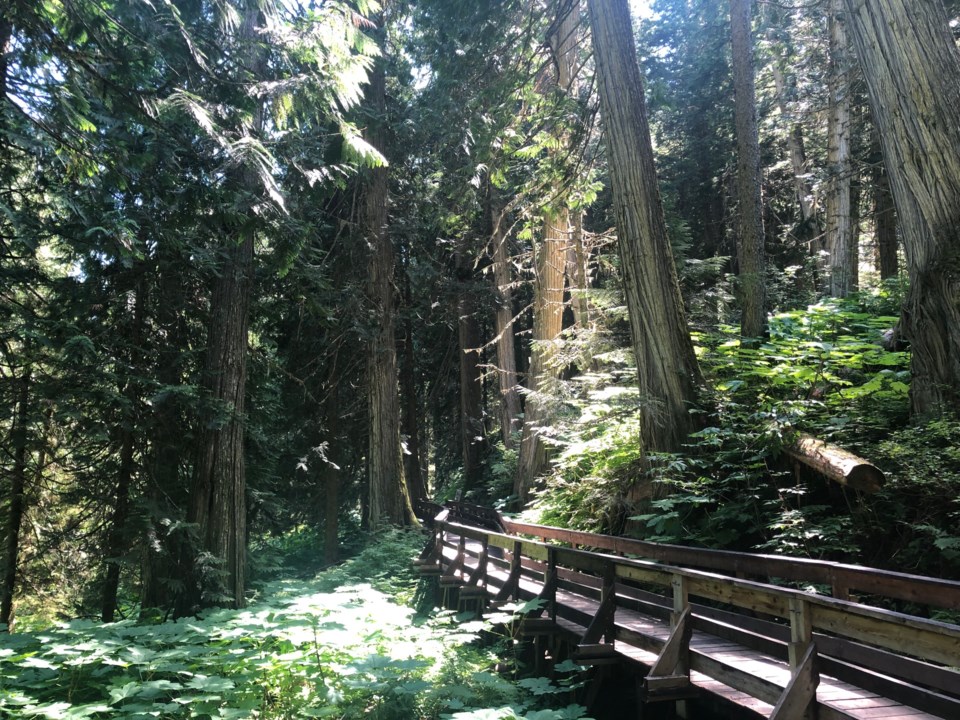The Ancient Forest/Chun T'oh Whudujut, east of Prince George, will see millions of dollars of new investment for improved amenities in the provincial park.
Lheidli T’enneh First Nation, the provincial and federal governments are all contributing towards the development of new facilities.
These include new riparian wetland hiking trails, an interpretive centre, sweat lodge, pit house, gazebo and improvements to the accessible amenities such as boardwalks, pathways, washrooms, access roads, parking and signage.
These will be developed over a three-year-period.
The Ancient Forest/Chun T’oh Whudujut is the only inland temperate rainforest in the world. It's located just 115 km east of Prince George and it brings you face-to-face with thousand-year-old western red cedars and a rich biodiversity of plants, mosses, lichens, and fungi.
The park already features 450 m long universal access boardwalk which allows people with all abilities to experience the area.
The Ancient Forest/Chun T’oh Whudujut is in Lheidli T’enneh traditional territory and is an area of cultural, ecological and environmental importance to the Lheidli T’enneh.
In August 2019, the picnic shelter (gathering place) was dedicated to late Lheidli T’enneh Elder Mary Gouchie during the annual Art in the Park event.
These new investments will see the Lheidli T’enneh contribute $870,254, the provincial government $1,305,380, and the federal government $6,526,901 which is a total of $8,702,535 in funding.
“On Sept.1 of 2018, LTN and the Ministry of Environment and Climate Change Strategy signed a Memorandum of Understanding to work together collaboratively on the planning and management of the Park. We appreciate the federal and BC government supporting this very important initiative. Supporting this project is indicative of BC’s commitment to work with our Nation, it also acknowledges that as stewards of our territory we have innate knowledge of the biodiversity and symbiotic relationship that exists within Chun T’oh Whudujut and the surrounding areas," says Lheidli T'enneh Dayi Clay Pountney, in a release.
"Our ancestors have visited the area for thousands of years to enjoy the huge western red cedar trees, the unique plants and vegetation and the spiritual aspects of the area. It’s a place our members and others can go for recreation, reflection and renewal and these project enhancements will make that experience ever more special.”
It is one of 24 projects in northern B.C. under the Investing in Canada Infrastructure Plan.
The Government of Canada is contributing more than $49.9 million, the Government of British Columbia is contributing over $15.4 million and the individual applicants are contributing more than $11.5 million to these projects through the Community, Culture, and Recreation Infrastructure Stream (CCRIS), and the Rural and Northern Communities Infrastructure Stream (RNIS) of the Investing in Canada Plan.
More than $40.5 million of the federal funding is going to 12 projects in Indigenous communities.
"Chun T’oh Whudujut is the only inland temperate rainforest in the world. This project will allow us to share an area of our territory that is very special to us," says Lheidli T’enneh Community Economic Development Manager Rena Zatorski.
"We intend to ensure that the visitor experience is memorable, respectful, and life-changing. This project will also provide new opportunities for our members not only during construction and development but in the long-term as guides and interpreters so we see this as very much a win-win-win for both governments and our Nation.”
Under the same program, Prince George also received its largest infrastructure investment in a decade with the provincial and federal governments contributing $10 million towards the new downtown pool.
“I am pleased to join with the federal government to invest in people and their communities,” B.C. Minister of Municipal Affairs and Housing Selina Robinson says in a news release regarding the investments.
“We know that these investments in public spaces, in all regions of the province, will strengthen relationships and promote mental and physical well-being. Working with local governments, Indigenous communities and other partners means that we can continue to deliver the services people count on and need right here in British Columbia.”
- This story has been updated to add comments from Lheidli T'enneh.





-old-growth-spruce-in-anzac-area.jpg;w=120;h=80;mode=crop)
